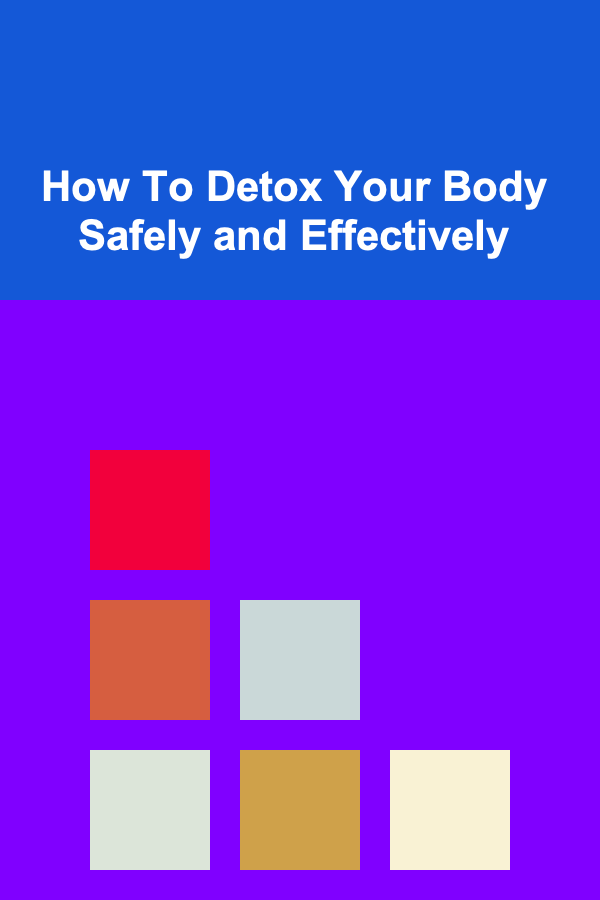
How To Detox Your Body Safely and Effectively
ebook include PDF & Audio bundle (Micro Guide)
$12.99$6.99
Limited Time Offer! Order within the next:

In the modern world, the concept of detoxification has gained significant popularity. From the rise of detox diets to the proliferation of supplements promising to cleanse the body, the desire for a healthier, cleaner body is widespread. The human body has its own natural detoxification systems, but there is still much debate about whether additional detox strategies are necessary. This article will explore how to detox your body safely and effectively, separating fact from fiction and offering practical advice on how to support your body's natural processes.
Understanding Detoxification
Detoxification refers to the process of eliminating toxins from the body. Toxins are harmful substances that can accumulate from various sources such as pollution, processed foods, alcohol, medications, and even stress. The body has multiple systems in place to rid itself of these toxins, primarily the liver, kidneys, digestive system, and skin. These systems work around the clock to filter out harmful substances and eliminate them through urine, feces, and sweat.
While the body is quite capable of detoxifying on its own, certain factors---such as poor diet, environmental pollutants, and lifestyle choices---can impair these natural processes, leading to an overload of toxins. This is where additional detoxification strategies may come into play.
Signs That Your Body Needs a Detox
Before beginning any detox program, it's important to recognize the signs that your body may need extra support. Common symptoms of toxin overload include:
- Fatigue: Constant tiredness despite adequate rest may be a sign that your body is struggling to eliminate toxins.
- Digestive Issues: Constipation, bloating, and indigestion are often associated with an overload of waste and toxins in the body.
- Skin Problems: Acne, eczema, or other skin issues can sometimes be linked to the body's inability to detoxify properly.
- Headaches: Frequent or chronic headaches may indicate that toxins are building up in the body.
- Brain Fog and Mood Swings: Poor cognitive function, irritability, and mood swings may be signs of a toxic overload affecting the nervous system.
- Unexplained Weight Gain: Toxins can affect metabolism, making it harder to maintain or lose weight.
If you are experiencing any of these symptoms, it might be a good idea to consider ways to support your body's detox processes.
How the Body Detoxifies Naturally
The body's detoxification process is highly efficient when functioning optimally. Below are the key organs involved in natural detoxification:
1. The Liver
The liver is the body's primary detoxification organ. It works continuously to filter blood coming from the digestive tract, breaking down toxins and turning them into substances that can be easily excreted. The liver converts fat-soluble toxins into water-soluble forms, making it easier for them to be eliminated through urine or bile.
2. The Kidneys
The kidneys filter blood to remove waste and excess substances, such as water, electrolytes, and toxins. They help maintain a healthy balance of minerals in the body, regulating hydration and blood pressure. The kidneys also play a crucial role in detoxifying by excreting water-soluble toxins through urine.
3. The Digestive System
The digestive system is responsible for breaking down food and absorbing nutrients. It also plays a vital role in eliminating waste products from the body. The intestines work to expel toxins, bacteria, and other harmful substances through bowel movements. A healthy gut is essential for effective detoxification.
4. The Skin
The skin is often overlooked when it comes to detoxification, but it is a key organ for eliminating toxins. Sweat glands excrete water, salt, and small amounts of toxins through perspiration. This process helps the body regulate temperature and eliminate certain waste products.
5. The Lungs
The lungs are responsible for expelling carbon dioxide, a waste product of metabolism. They also help remove other volatile toxins from the body, including those from pollutants and cigarette smoke. Breathing deeply and exercising can help improve lung function and facilitate detoxification.
Safe and Effective Ways to Detoxify the Body
While detoxing the body may sound like a complex and overwhelming task, there are several safe and effective ways to support your body's natural detox processes. The key is to focus on nourishing and supporting the organs responsible for detoxification, rather than attempting extreme or restrictive detox regimens.
1. Hydrate Adequately
Drinking plenty of water is one of the simplest and most effective ways to support detoxification. Water helps flush toxins from the kidneys and promotes healthy digestion. Aim to drink at least eight 8-ounce glasses of water a day, and more if you are physically active or live in a hot climate.
You can also enhance hydration by incorporating herbal teas such as dandelion or ginger, which have detoxifying properties. Adding lemon or cucumber to your water can improve its flavor and provide additional detox benefits due to the antioxidants and vitamin C they contain.
2. Eat a Nutrient-Dense, Whole-Food Diet
A healthy, whole-food diet is essential for supporting the body's natural detox systems. Focus on consuming a variety of nutrient-dense, unprocessed foods, including:
- Fruits and Vegetables: These provide fiber, antioxidants, and essential vitamins and minerals that support detoxification. Cruciferous vegetables (such as broccoli, cauliflower, and kale) are particularly beneficial due to their ability to enhance liver detoxification.
- Healthy Fats: Omega-3 fatty acids found in foods like flaxseeds, chia seeds, and fatty fish can help reduce inflammation and support liver function.
- Fiber-Rich Foods: Fiber aids in digestion and helps eliminate toxins through bowel movements. Whole grains, legumes, and vegetables are excellent sources of fiber.
In addition to these foods, it's important to limit processed foods, refined sugars, and unhealthy fats, as they can burden the body with toxins and inflammation.
3. Exercise Regularly
Regular physical activity is an important part of any detox program. Exercise helps improve circulation, boost metabolism, and stimulate the lymphatic system, all of which facilitate detoxification.
Exercise also promotes sweating, which can help eliminate toxins through the skin. Activities like yoga, walking, running, or strength training can all support the body's detox processes.
4. Get Enough Sleep
Sleep is crucial for detoxification, as many of the body's repair processes occur during rest. The liver, for example, is particularly active at night in breaking down and eliminating toxins. Aim for 7-9 hours of quality sleep per night to allow your body the time it needs to detoxify and regenerate.
5. Practice Stress Management
Chronic stress can impair the body's detoxification systems by increasing inflammation and disrupting hormonal balance. Finding ways to manage stress is essential for maintaining optimal health. Consider incorporating relaxation techniques into your daily routine, such as:
- Meditation: A practice that can calm the mind and reduce stress.
- Breathing Exercises: Deep, diaphragmatic breathing can activate the parasympathetic nervous system, which promotes relaxation and supports detoxification.
- Mindfulness: Practicing mindfulness can help reduce stress and improve mental clarity.
6. Incorporate Detoxifying Herbs and Supplements
Certain herbs and supplements can support detoxification by enhancing the function of the liver, kidneys, and digestive system. Some popular detoxifying herbs include:
- Milk Thistle: Known for its liver-protective properties, milk thistle can help stimulate detoxification and improve liver function.
- Dandelion Root: This herb is a natural diuretic that can promote kidney health and help flush out toxins through urine.
- Turmeric: The active compound in turmeric, curcumin, has anti-inflammatory and antioxidant properties that support liver detoxification.
- Ginger: Known for its digestive benefits, ginger can stimulate the gastrointestinal tract and promote healthy digestion.
Before taking any new supplements, it's important to consult with a healthcare provider to ensure they are safe for you, especially if you have any underlying health conditions.
7. Avoid Toxins
While detoxification can help eliminate toxins from the body, it is also important to reduce exposure to new toxins. Some steps you can take to minimize toxin exposure include:
- Avoid processed foods: Many packaged foods contain additives, preservatives, and artificial ingredients that can burden the body.
- Choose organic produce: Pesticides and herbicides used in conventional farming can introduce harmful chemicals into the body. Organic fruits and vegetables tend to have lower pesticide residues.
- Limit alcohol and tobacco: These substances are known toxins that can impair the body's detoxification systems and lead to long-term health problems.
- Reduce exposure to environmental toxins: Use natural cleaning products, avoid unnecessary exposure to pollutants, and limit your use of plastic.
The Risks of Extreme Detox Diets
While some detox diets promise quick results, it's important to approach any detox regimen with caution. Extreme detox plans---such as juice cleanses, fasting, or detox supplements---can have potential risks and may not be sustainable in the long term.
Fasting or severely restricting calorie intake can lead to nutrient deficiencies, dehydration, and metabolic imbalances. Additionally, some detox supplements may contain harmful ingredients or promote laxative use, leading to dehydration or digestive distress.
It's always best to focus on gradual, sustainable changes to your diet and lifestyle that support your body's natural detoxification processes, rather than opting for extreme detox solutions that may not be effective or safe.
Conclusion
Detoxification is a natural and ongoing process that the body carries out every day. By supporting the body's detox systems through hydration, a balanced diet, regular exercise, and stress management, you can help optimize your body's ability to eliminate toxins and maintain good health. Remember that detoxification is not a one-time event or quick fix, but rather a lifelong process that involves maintaining healthy habits.
If you're considering a detox program or supplements, consult with a healthcare professional to ensure that it is safe and appropriate for you. By prioritizing long-term, holistic health practices, you can support your body's detoxification processes and enjoy better overall well-being.

How to Create a Grocery Shopping Checklist Based on Your Meal Plan
Read More
How to Gather and Organize Supporting Documents for Your Grant Application
Read More
Start Here: How to Start a Side Hustle
Read More
How to Secure Government Grants for Renewable Energy Projects
Read More
How to Create a Family Emergency Communication Plan: A To-Do List
Read More
How to Build a Career as a Petroleum Engineer
Read MoreOther Products

How to Create a Grocery Shopping Checklist Based on Your Meal Plan
Read More
How to Gather and Organize Supporting Documents for Your Grant Application
Read More
Start Here: How to Start a Side Hustle
Read More
How to Secure Government Grants for Renewable Energy Projects
Read More
How to Create a Family Emergency Communication Plan: A To-Do List
Read More